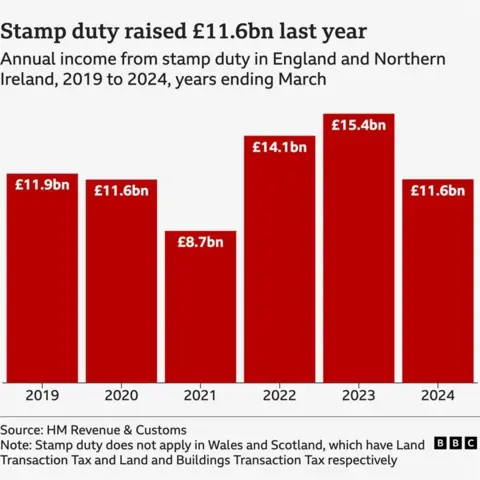Business
Stamp duty: Five ways abolishing the tax could change the housing market

Kevin PeacheyCost of living correspondent
 Getty Images
Getty ImagesThe debate around stamp duty is intensifying. When Kemi Badenoch said a future Conservative government would abolish it on the purchase of main homes, it went down well at the Tory Party conference.
There has also been speculation that the Chancellor, Rachel Reeves, is considering replacing it.
Scrapping stamp duty would be popular among some home buyers, including first-time buyers. There’s been widespread support in the housing sector as well as among some independent economists.
Analysts say there would be some significant consequences of scrapping stamp duty for primary residences, affecting buyers, sellers and the wider UK economy.
1. House prices might rise
Whenever there has been a temporary easing of stamp duty, such as in the immediate aftermath of the Covid lockdowns, house prices have then risen.
It is more difficult to judge whether a permanent abolition would have the same long-term impact on prices as the short-term sweetener of a stamp duty holiday.
However, greater demand is likely to feed through to asking prices.
“If, and this is a big if, it is a simple tax giveaway, the likelihood is that the current stamp duty bill simply passes through into prices,” says Lucian Cook, head of residential research at Savills.
In turn, that could mean first-time buyers paying less in stamp duty, but having to find a bigger deposit.
“Given the way stamp duty works, this would be unevenly distributed across the country,” Mr Cook added.
The most obvious point here is that the government in Westminster can only control stamp duty in England and Northern Ireland. Scotland and Wales have their own land and transaction taxes overseen by the devolved administrations.
2. Tax cut for wealthy
A swathe of first-time buyers do not pay stamp duty. That’s because, in England and Northern Ireland, they are exempt when buying properties of up to £300,000.
“For them, the enormous challenge is raising a deposit,” says Sarah Coles, head of personal finance at investment platform Hargreaves Lansdown.
Data from property portal Rightmove suggests that 40% of homes for sale in England are stamp duty free for first-time buyers.
While the vast majority of movers pay stamp duty, the rate increases at certain price thresholds.
So, the bigger the home, the bigger the benefit, if stamp duty was scrapped.
This will also mean a big regional difference in the impact of such a policy.
At the moment, 76% of properties on sale in the North East of England are free of stamp duty for first-time buyers, according to Rightmove’s figures. In London, it is only 11%.
Richard Donnell, from Zoopla, points out that 60% of all stamp duty is paid in southern England – so the majority of the benefit of abolition would be felt in the south.
3. Easier to find somewhere to move to
One of the great selling points of stamp duty abolition is the extra mobility it should provide for workers, buyers, sellers and downsizers, according to experts.
“Homeownership is the foundation of a fairer and more secure society – but stamp duty has denied that opportunity to too many for too long,” says Paula Higgins, chief executive of the Homeowners Alliance.
“Our research shows over 800,000 homeowners have shelved moving plans in the past two years, and stamp duty is a major barrier.”
The Institute for Fiscal Studies (IFS), an independent economic think tank, describes stamp duty as “one of the most econmically damaging taxes”. In its most recent analysis, it says particular winners will be those who want to move frequently, to more or less expensive homes.
It should, for example, clear an obstacle for older homeowners, who want to sell a family home but are discouraged by stamp duty. If they are more likely to move, then their homes become available to younger families and the whole market becomes more fluid.
However, others suggest the influence of stamp duty could be overblown.
“Take someone downsizing, from a £750,000 property to a £300,000 one. In England and Northern Ireland, they’d pay £5,000 in stamp duty. It’s a fraction of what they’re likely to pay in estate agency fees, and sits along a huge range of costs from conveyancing to removals,” Ms Coles from Hargreaves Lansdown says.
“It begs the question of whether removing the cost of the tax is a gamechanger.”
4. Potential tax rises elsewhere
Stamp duty raises a lot of money for the Treasury, so scrapping it would leave a gap in the public finances.
The IFS said that the direct cost of the Conservative policy might be around £10.5bn to £11bn in 2029-30, although the Tories’ own estimate is about £9bn.

The question for any administration tempted to scrap or reduce stamp duty is how else it finds the money.
The Conservatives say they will make savings elsewhere. They also say the policy will boost growth and the housing sector in general, and therefore bring in more tax receipts.
The other option is to raise other taxes. As some analysts have said, the main consideration is not what is scrapped, but what replaces it.
5. Impact on renters
The idea of scrapping stamp duty for primary residences will benefit homeowners but could end up meaning less choice for renters.
The IFS suggests it could discourage the purchase of rental properties by landlords, as they would still have to pay stamp duty.
The think tank says it would increase the more favourable tax treatment of owner-occupation relative to renting.
Business
OGRA Announces LPG Price Increase for December – SUCH TV

The Oil and Gas Regulatory Authority (OGRA) has approved a fresh increase in the price of liquefied petroleum gas (LPG), raising the cost for both domestic consumers and commercial users.
According to the notification issued, the LPG price has been increased by Rs7.39 per kilogram, setting the new rate at Rs209 per kg for December. As a result, the price of a domestic LPG cylinder has risen by Rs87.21, bringing the new price to Rs2,466.10.
In November, the price of LPG stood at Rs201 per kg, while the domestic cylinder was priced at Rs2,378.89.
The latest price hike is expected to put additional pressure on households already grappling with rising living costs nationwide.
Business
Private sector data: Over 2 lakh private companies closed in 5 years; govt flags monitoring for suspicious cases – The Times of India

NEW DELHI: The government on Monday said that over the past five years, more than two lakh private companies have been closed in India.According to data provided by Minister of State for Corporate Affairs Harsh Malhotra in a written reply to the Lok Sabha, a total of 2,04,268 private companies were shut down between 2020-21 and 2024-25 due to amalgamation, conversion, dissolution or being struck off from official records under the Companies Act, 2013.Regarding the rehabilitation of employees from these closed companies, the minister said there is currently no proposal before the government, as reported by PTI. In the same period, 1,85,350 companies were officially removed from government records, including 8,648 entities struck off till July 16 this fiscal year. Companies can be removed from records if they are inactive for long periods or voluntarily after fulfilling regulatory requirements.On queries about shell companies and their potential use in money laundering, Malhotra highlighted that the term “shell company” is not defined under the Companies Act, 2013. However, he added that whenever suspicious instances are reported, they are shared with other government agencies such as the Enforcement Directorate and the Income Tax Department for monitoring.A major push to remove inactive companies took place in 2022-23, when 82,125 companies were struck off during a strike-off drive by the corporate affairs ministry.The minister also highlighted the government’s broader policy to simplify and rationalize the tax system. “It is the stated policy of the government to gradually phase out exemptions and deductions while rationalising tax rates to create a simple, transparent, and equitable tax regime,” he said. He added that several reforms have been undertaken to promote investment and ease of doing business, including substantial reductions in corporate tax rates for existing and new domestic companies.
Business
Pakistan’s Textile Exports Reach Historic High in FY2025-26 – SUCH TV

Pakistan’s textile exports surged to $6.4 billion during the first four months of the 2025-26 fiscal year, marking the highest trade volume for the sector in this period.
According to the Pakistan Bureau of Statistics (PBS), value-added textile sectors were key contributors to the growth.
Knitwear exports reached $1.9 billion, while ready-made garments contributed $1.4 billion.
Significant increases were observed across several commodities: cotton yarn exports rose 7.74% to $238.9 million, and raw cotton exports jumped 100%, reaching $2.6 million from zero exports the previous year.
Other notable gains included tents, canvas, and tarpaulins, up 32.34% to $53.48 million, while ready-made garments increased 5.11% to $1.43 billion.
Exports of made-up textile articles, excluding towels and bedwear, rose 4.17%, totaling $274.75 million.
The report also mentioned that the growth in textile exports is a result of improved global demand and stability in the value of the Pakistani rupee.
-

 Sports1 week ago
Sports1 week agoWATCH: Ronaldo scores spectacular bicycle kick
-

 Entertainment1 week ago
Entertainment1 week agoWelcome to Derry’ episode 5 delivers shocking twist
-

 Politics1 week ago
Politics1 week agoWashington and Kyiv Stress Any Peace Deal Must Fully Respect Ukraine’s Sovereignty
-

 Business1 week ago
Business1 week agoKey economic data and trends that will shape Rachel Reeves’ Budget
-

 Politics1 week ago
Politics1 week ago53,000 Sikhs vote in Ottawa Khalistan Referendum amid Carney-Modi trade talks scrutiny
-

 Tech6 days ago
Tech6 days agoWake Up—the Best Black Friday Mattress Sales Are Here
-

 Tech1 day ago
Tech1 day agoGet Your Steps In From Your Home Office With This Walking Pad—On Sale This Week
-

 Fashion1 week ago
Fashion1 week agoCanada’s Lululemon unveils team Canada kit for Milano Cortina 2026






